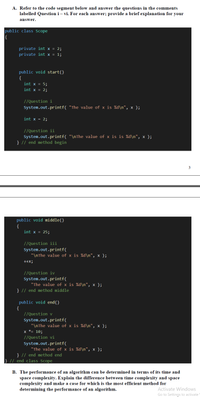
Database System Concepts
7th Edition
ISBN: 9780078022159
Author: Abraham Silberschatz Professor, Henry F. Korth, S. Sudarshan
Publisher: McGraw-Hill Education
expand_more
expand_more
format_list_bulleted
Question

Transcribed Image Text:A. Refer to the code segment below and answer the questions in the comments
labelled Question i – vi. For each answer; provide a brief explanation for your
answer.
public class Scope
|{
private int x = 2;
private int x = 1;
public void start()
{
int x = 5;
int x = 2;
//Question i
System.out.printf( "The value of x is %d\n", x );
int x = 2;
//Question ii
System.out.printf( "\nThe value of x is is %d\n", x );
} // end method begin
3
public void middle()
{
int x = 25;
//Question iii
System.out.printf(
"\nThe value of x is %d\n", x );
+x;
//Question iv
System.out.printf(
"The value of x is %d\n", x );
} // end method middle
public void end()
{
//Question v
System.out.printf(
"\nThe value of x is %d\n", x );
x *= 10;
//Question vi
System.out.printf(
"The value of x is %d\n", x );
} // end method end
} // end class Scope
B. The performance of an algorithm can be determined in terms of its time and
space complexity. Explain the difference between time complexity and space
complexity and make a case for which is the most efficient method for
determining the performance of an algorithm.
Activate Windows
Go to Settings to activate
Expert Solution
This question has been solved!
Explore an expertly crafted, step-by-step solution for a thorough understanding of key concepts.
Step by stepSolved in 3 steps

Knowledge Booster
Learn more about
Need a deep-dive on the concept behind this application? Look no further. Learn more about this topic, computer-science and related others by exploring similar questions and additional content below.Similar questions
- Determine the distance between point (x1, y1) and point (x2, y2), and assign the result to pointsDistance. The calculation is:Distance = SquareRootOf( (x2 - x1)2 + (y2 - y1)2 ) #include <stdio.h>#include <math.h> int main(void) { double x1; double y1; double x2; double y2; double xDist; double yDist; double pointsDistance; xDist = 0.0; yDist = 0.0; pointsDistance = 0.0; scanf("%lf", &x1); scanf("%lf", &y1); scanf("%lf", &x2); scanf("%lf", &y2); /* Your solution goes here */ printf("%lf\n", pointsDistance); return 0;arrow_forwardKindly solve this C++ program and follow all the instructions! Please let me know how should I contact you for further assistance. Thank you for your help!arrow_forwardint stop = 6; int num =6; int count=0; for(int i = stop; i >0; i-=2) { num += i; count++; } System.out.println("num = "+ num); System.out.println("count = "+ count); } }arrow_forward
- correct the codearrow_forwardQuestion #4: Re-write the program of Question #3 using data files. The input data numbers.txt contains (positive) integer numbers. Each time the program reads a number, check whether it is a prime and stores the result in the output file Results.txt. 373 373 is Prime!! 11 11 is Prime!! 2552 is NOT prime!! 5 is Prime!! 3561 is NOT prime!! 2552 3561 numbers.txt Results.txtarrow_forwardusing System; class Program { publicstaticvoid Main(string[] args) { int number = 1; while (number <= 88) { Console.WriteLine(number); number = number + 2; } Random r = new Random(); int randNo= r.Next(1,88); Console.WriteLine("Random Number between 1 and 88 is "+randNo); } } how would this program be modified to choose three random numbers instead of just one number between 1-88?arrow_forward
- in this code, the integer on each line shows the line number that is not part of code: what are the parameters of sum: ____ 1 public static int sum(int x, int y){ 2 int z = x +y; 3 return z; 4 } 5 public static void main(String[] args){ 6 … 7 sum(a+2, b); 8 … 9 }arrow_forwardpublic static class Lab2{public static void Main(){int idNum;double payRate, hours, grossPay;string firstName, lastName;// prompt the user to enter employee's first nameConsole.Write("Enter employee's first name => ");firstName = Console.ReadLine();// prompt the user to enter employee's last nameConsole.Write("Enter employee's last name => ");lastName = Console.ReadLine()// prompt the user to enter a six digit employee numberConsole.Write("Enter a six digit employee's ID => ");idNum = Convert.ToInt32(Console.ReadLine());// prompt the user to enter the number of hours employeeworkedConsole.Write("Enter the number of hours employee worked =>");// prompt the user to enter the employee's hourly pay rateconsole.Write("Enter employee's hourly pay rate: ");payRate = Convert.ToDouble(Console.ReadLine());// calculate gross paygrossPay = hours * payRate;// output resultsConsole.WriteLine("Employee {0} {1}, (ID: {2}) earned {3}",firstName, lastName, idNum,…arrow_forwardRemaining Time: 31 minutes, 51 seconds. ¥ Question Completion Status: What is the error in the below code? Provide your explanation. #include using namespace std; class parent{ private: int i, j; public: parent (int i, int j) class child: public parent { public void show(){ cout<<" i = "<arrow_forward
arrow_back_ios
arrow_forward_ios
Recommended textbooks for you
 Database System ConceptsComputer ScienceISBN:9780078022159Author:Abraham Silberschatz Professor, Henry F. Korth, S. SudarshanPublisher:McGraw-Hill Education
Database System ConceptsComputer ScienceISBN:9780078022159Author:Abraham Silberschatz Professor, Henry F. Korth, S. SudarshanPublisher:McGraw-Hill Education Starting Out with Python (4th Edition)Computer ScienceISBN:9780134444321Author:Tony GaddisPublisher:PEARSON
Starting Out with Python (4th Edition)Computer ScienceISBN:9780134444321Author:Tony GaddisPublisher:PEARSON Digital Fundamentals (11th Edition)Computer ScienceISBN:9780132737968Author:Thomas L. FloydPublisher:PEARSON
Digital Fundamentals (11th Edition)Computer ScienceISBN:9780132737968Author:Thomas L. FloydPublisher:PEARSON C How to Program (8th Edition)Computer ScienceISBN:9780133976892Author:Paul J. Deitel, Harvey DeitelPublisher:PEARSON
C How to Program (8th Edition)Computer ScienceISBN:9780133976892Author:Paul J. Deitel, Harvey DeitelPublisher:PEARSON Database Systems: Design, Implementation, & Manag...Computer ScienceISBN:9781337627900Author:Carlos Coronel, Steven MorrisPublisher:Cengage Learning
Database Systems: Design, Implementation, & Manag...Computer ScienceISBN:9781337627900Author:Carlos Coronel, Steven MorrisPublisher:Cengage Learning Programmable Logic ControllersComputer ScienceISBN:9780073373843Author:Frank D. PetruzellaPublisher:McGraw-Hill Education
Programmable Logic ControllersComputer ScienceISBN:9780073373843Author:Frank D. PetruzellaPublisher:McGraw-Hill Education

Database System Concepts
Computer Science
ISBN:9780078022159
Author:Abraham Silberschatz Professor, Henry F. Korth, S. Sudarshan
Publisher:McGraw-Hill Education

Starting Out with Python (4th Edition)
Computer Science
ISBN:9780134444321
Author:Tony Gaddis
Publisher:PEARSON

Digital Fundamentals (11th Edition)
Computer Science
ISBN:9780132737968
Author:Thomas L. Floyd
Publisher:PEARSON

C How to Program (8th Edition)
Computer Science
ISBN:9780133976892
Author:Paul J. Deitel, Harvey Deitel
Publisher:PEARSON

Database Systems: Design, Implementation, & Manag...
Computer Science
ISBN:9781337627900
Author:Carlos Coronel, Steven Morris
Publisher:Cengage Learning

Programmable Logic Controllers
Computer Science
ISBN:9780073373843
Author:Frank D. Petruzella
Publisher:McGraw-Hill Education